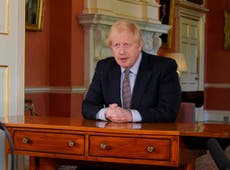Boris Johnson is no longer a prime minister of the whole United Kingdom – but you won’t see him admit it
Will the British government permit Scotland to borrow the money to pay for a longer lockdown? As a de facto asymmetric federal state, the UK is now functioning very badly

Boris Johnson may, formally, be prime minister of the United Kingdom – a title he plainly cherishes, words he must roll around his palate like a fine aged port – but it should be dawning on the rest of us that he is really only the pandemic prime minister of England. The UK is over, at least so far as the fight to defeat the coronavirus is concerned, and our national unity is the latest casualty of this “devilish illness”, as the first minister of the Province of England calls it.
You’d never think that, though, watching his UK-wide broadcast – or indeed where much of the media reporting is concerned. According to Johnson there is a new plan for “the whole country” and although he has (loaded word) “consulted” the four nations of the UK, “I believe that as prime minister of the United Kingdom – Scotland, England, Wales, Northern Ireland – there is a strong resolve to defeat this together”.
Well, Boris, you can “believe” all you like, but devolved administrations have much more than a right to be “consulted” (or ignored) by you; they have a complete veto so far as their own territories are concerned. If they don’t wish to change the rules or the messaging, or both, then they won’t. And, indeed, they have not. They’re all sticking with “Stay at Home” as the primary message to their people. And Nicola Sturgeon, prime – sorry, first – minister of Scotland added the jibe: “I don’t know what ‘stay alert’ means”.
As for Johnson’s “roadmap”, it stops at the border. Sturgeon said she hadn’t seen the new slogans before they appeared in the newspapers and she will choose whether to “sign up” for the Johnson plan, or parts of it, when she’s studied it and is satisfied it suits Scotland (and her). If she doesn’t want to run the traffic light Covid-19 alert system, she doesn’t have to – she has her own experts and all the powers she needs to break away.
She doesn’t want the “Stay Alert” slogan used on her turf – and she can impose a fine on a party of English motorists who drive up for a round of golf at St Andrews if she wants.
Arlene Foster, Michelle O’Neill and Mark Drakeford have all been somewhat more polite about asserting their prerogatives – but then again they’ve never been called “that bloody wee Jimmy Krankie woman” by the English leader, or whatever the disparaging Ulster/Irish/Welsh equivalents might be.
Sturgeon wanted Johnson to make clear in his address that his plans don not apply to Scotland, except for the section on air travel; he studiously ignored her. The word “England” was never mentioned by him. He spoke as if it was up to him whether the schools in Pontypool or Dundee or Strabane open up on June. It isn’t.
It is pathetic to see Johnson pretending his writ runs right across the UK. It would have been better if he’d been a bit more magnanimous about the devolution settlement, but he couldn’t bring himself to be honest with the British people.
It can’t be easy for such very English Tory to have to negotiate with Labour (Wales), SNP (Scotland) Sinn Fein and DUP (Northern Ireland) – politicians with real power, and some of them dedicated to the destruction of the UK. He obviously finds it irksome. By the same token it would be better if Sturgeon (less so the other figures) did not behave as if the UK was as relevant an institution to her as the Commonwealth. But she’s more skilful than Johnson at observing the niceties.
And here things would rest, in a bad tempered equilibrium, were it not for money and the furlough scheme.
In the UK, despite devolution, money is still largely controlled by London. The moment may come soon when the furlough scheme starts to be run down. Johnson has already started to wind it up for construction and manufacturing in England, and the 80 per cent wage subsidy will be eroded in the coming months.
If Cardiff, Belfast and Edinburgh wish to maintain a longer, fuller lockdown, is the Treasury and the UK government, led by Johnson, going to pay their bills? If it refuses, is that English bullying at the risk of lives lost? Or, contrariwise, is it fair that English workers are having to go back to work while their counterparts elsewhere are still at home on 60 per cent, or even 80 per cent of their salaries? What will that do for national solidarity?
Will the British government permit Scotland to borrow the money to pay for a longer lockdown? Or ask the Scottish government to use its powers raise taxes in future to “pay back” the cost of a longer Scotland-only furlough? Would Holyrood want that?
As a de facto asymmetric federal state, the UK is functioning badly because there are no structures to resolve such differences. Cobra is not well suited to the task. As Drakeford describes it, four-nation cooperation works “in fits and starts”, and that is not really good enough in the midst of a pandemic.
Sturgeon suggested, with a certain logic, that the only way to end lockdown together as a United Kingdom (in more than name) is to go at the speed of the slowest member to protect all, like a Second World War Atlantic convoy. But that doesn’t suit the bullish faux emperor sat in regency splendour in Number 10. The prime minister of England is still in denial.




Join our commenting forum
Join thought-provoking conversations, follow other Independent readers and see their replies